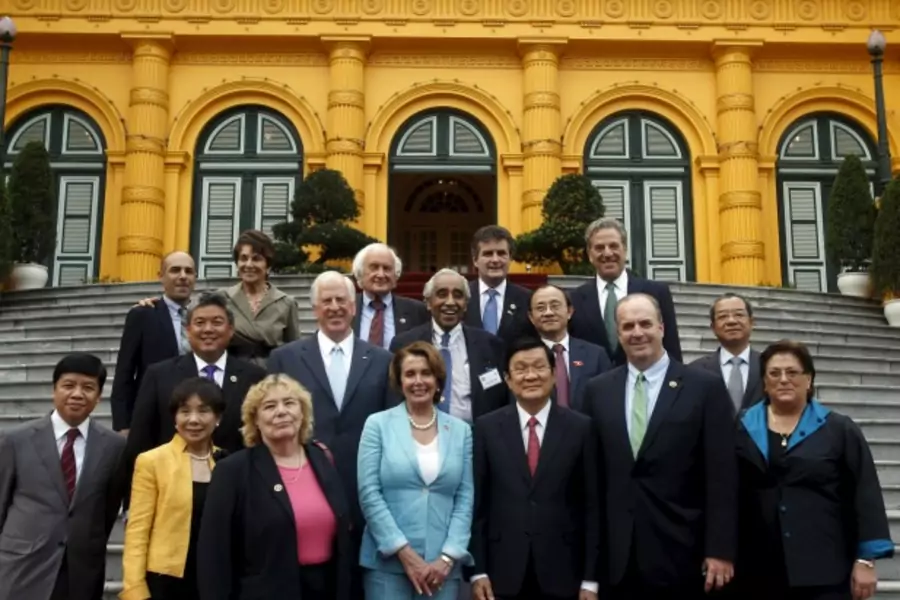What Happens to Congressional Southeast Asia Policy Under a New U.S. Administration?

More on:
Unlike many regions of the world, where U.S. foreign policy has in recent decades been dominated by the executive branch, since the end of the Cold War Congress has played a major role in policy toward much of Southeast Asia. In mainland Southeast Asia, in fact, Congress has often been the dominant foreign policy actor, in part because successive U.S. administrations---throughout the 1990s and 2000s---placed a relatively low priority on mainland Southeast Asia. (This of course was not true during much of the Cold War, when Southeast Asia was a major battleground.) Congressional leaders, focused on rights in Myanmar, shaped sanctions in the 1990s, and dominated Myanmar policy until the Obama administration pushed for a new approach to the country. Even then, the White House worked closely with congressional leaders like Senate Majority Leader Mitch McConnell on Myanmar policy, and congressional leaders retained significant leverage over relations with Naypyidaw---even in an era in which sanctions have been removed. Congressional leaders have been outspoken about abuses against Rohingya in Myanmar and have called on the United States to play a bigger role in helping address the Rohingya crisis, for instance.
A similar situation has been true, in recent years, regarding other nations in mainland Southeast Asia. Congressional leaders, including McConnell, held a public hard line against Cambodian Prime Minister Hun Sen, even as the Obama administration initiated closer military ties with Phnom Penh. Senator John McCain has historically played a major role in shaping U.S.-Vietnam policy. Similarly, congressional staffers have played a prominent role in pushing Washington to take a tough approach to Thailand since the 2014 coup and the years of junta rule. And last fall, Senator Benjamin Cardin likened Philippine President Rodrigo Duterte’s drug war to “mass murder;" he and other senators have warned that Duterte’s actions could lead to new limitations being placed on U.S. security assistance to Manila.
Now what will happen to Congress’ role on Southeast Asia policy, especially toward mainland Southeast Asia? As Andrew Selth notes, the new U.S. administration’s overall disinterest in rights promotion is likely to prompt the White House to downgrade the role of rights in bilateral relations with autocracies or flawed democracies. This could be true of relations with Thailand, Cambodia, Vietnam, the Philippines, and other Southeast Asian nations as well. Selth speculates that a disinterest in rights-related issues with Myanmar could lead to increases in U.S. training for Myanmar military and national police force members, despite these outfits poor past human rights records and the ongoing crisis in western Myanmar, which includes widespread reports of major abuses by the security forces.
Clearly, some authoritarians in Southeast Asia are hoping that the new U.S. administration will downplay rights and take a wholly transactional approach to bilateral diplomacy, or will mostly just ignore the region. Hun Sen and Duterte seemed enthusiastic about President Trump’s campaign before the November 8 election. Hun Sen has in recent months cited the U.S. administration’s harsh approach to the press as akin to his own often brutal treatment of reporters and dissent in general. As the New York Times reported, in February Hun Sen’s spokesman “cited the American leader in threatening to shutter foreign news outlets, including some that receive money from Washington.” The spokesman was referring to outlets like Voice of America and Radio Free Asia. In March, the Cambodian government pressed its case further, asking Voice of America’s Khmer service “Why is it OK for the United States to do it [take a harsh approach to reporters] and when Cambodia reacts ... we are accused of dictatorship?” As Australian Broadcasting Corporation notes, even the Myanmar government, led by Suu Kyi, also has embraced the U.S. president’s “fake news” approach to reporters, in order to cast doubt on the veracity of reports of military abuses in Rakhine State including rape. As the ABC notes, the Myanmar government issued a statement denying the rape reports---the statement was “embossed with a big red stamp that says ‘fake rape.’”
Will Congressional leaders continue to assert a major role on Southeast Asia policy? They have not been shy of doing so in the past, even when presidents come from their own party. Pushing for a continued focus on rights in Cambodia, Laos, Vietnam, Myanmar, the Philippines, Thailand, and other Southeast Asian nations will be complicated if the executive branch rhetorically downplays rights, as it seems to have done by presenting the State Department’s annual human rights report without a in-person introduction from the secretary of state. Yet at the same time, the new administration seems less interested in Southeast Asia overall, compared to the Obama administration---other than issues related to the South China Sea. This gap potentially leaves an opening for congressional leaders to continue playing an outsized role on foreign policy in relation to Southeast Asia issues other than the South China Sea. And there remains a strong current of support among congressional staffers, on both sides of the aisle, for making rights a priority in Southeast Asia, and for generally continuing to exert U.S. influence in Southeast Asia.
Two key tests of whether Capitol Hill is paying attention will come in Cambodia and the Philippines. If Duterte continues to oversee an abusive drug war, will Cardin and Republican colleagues indeed put new conditions on security assistance---even though Duterte, who harshly criticized the Obama administration, seems open to a warm relationship with the new U.S. president? The challenge with Duterte and U.S. security aid will be exacerbated, as Murray Hiebert notes, if the Philippine president involves the military, rather than the police, in his drug war. And will the GOP’s congressional leaders continue to highlight Hun Sen’s abuses, which have worsened in 2016 and 2017, even as the Cambodian leader draws parallels between his own approach and that of the White House?
More on:
 Online Store
Online Store